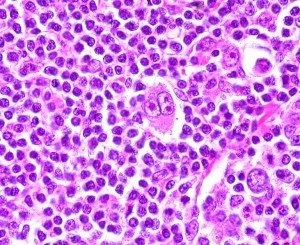August 29th, 2011 by Elaine Schattner, M.D. in News
No Comments »

 Recently, the FDA announced its approval, upon accelerated review, of a new drug, Adcetris (brentuximab) for patients with Hodgkin’s lymphoma that has relapsed after bone marrow transplant and for some patients with T-cell anaplastic large cell lymphoma (ALCL).
Recently, the FDA announced its approval, upon accelerated review, of a new drug, Adcetris (brentuximab) for patients with Hodgkin’s lymphoma that has relapsed after bone marrow transplant and for some patients with T-cell anaplastic large cell lymphoma (ALCL).
This interests me for a lot of reasons, among them that I used to work in the field of lymphoma immunology and spent some time in my life studying molecules like CD30, the protein to which the new antibody binds.
First, a mini-primer on the disease and numbers of patients involved: Read more »
*This blog post was originally published at Medical Lessons*
August 23rd, 2011 by Elaine Schattner, M.D. in Opinion, Research
No Comments »

There’s so much weird and exciting cancer news this week, it’s hard to keep up!
Double-kudos to Andrew Pollack on his front-page and careful coverage in the New York Times of the hyperthermic intraperitoneal chemotherapy (Hipec) technique that’s being used at some name-brand health care facilities to treat colon cancer.
First, he spares no detail in the Times describing the seemingly primitive, crude method:
….For hours on a recent morning at the University of California, San Diego, Dr. Andrew Lowy painstakingly performed the therapy on a patient.
After slicing the man’s belly wide open, Read more »
*This blog post was originally published at Medical Lessons*
August 21st, 2011 by GarySchwitzer in News, Opinion
No Comments »

Right off the top, let me be clear that I am NOT minimizing the importance of this week’s news about an experimental treatment for leukemia – one that has drawn much news attention.
It is an important finding.
What I am commenting on herein is the news coverage.
The ABC television piece itself wasn’t bad, with good perspective from Dr. Len Lichtenfeld of the American Cancer Society. But the lead-in and the ending, both involving anchor Diane Sawyer, were hyperbolic. The following screenshot was part of Sawyer’s lead-in. Read more »
*This blog post was originally published at Gary Schwitzer's HealthNewsReview Blog*
August 16th, 2011 by Elaine Schattner, M.D. in News, Opinion
2 Comments »

Last Sunday’s New York Times featured an op-ed by Dr. Ezekiel Emanuel, on the oncology drug shortage. It’s a serious problem that’s had too-little attention in the press:
Of the 34 generic cancer drugs on the market, as of this month, 14 were in short supply. They include drugs that are the mainstay of treatment regimens used to cure leukemia, lymphoma and testicular cancer.
Emanuel considers that these cancer drug shortages have led to what amounts to an accidental rationing of cancer meds. Some desperate and/or influential patients (or doctors or hospitals) get their planned chemo and the rest, well, don’t.
Unfortunately, Read more »
*This blog post was originally published at Medical Lessons*
July 18th, 2011 by Elaine Schattner, M.D. in Opinion, Research
No Comments »

Yesterday’s post was not really about Avastin, but about medical journalism and how patients’ voices are handled by the media.
L. Husten, writing on a Forbes blog, cried that the press fawned, inappropriately, over patients’ words at the FDA hearing last week, and that led him to wonder why and if journalists should pay attention to what people with illness have to say, even if their words go against the prevailing medical wisdom.
There’s a fair amount of controversy on this. For sake of better discussion in the future, I think it best to break it up into 3 distinct but inter-related issues:
1. About health care journalism and patients’ voices:
A general problem I perceive (and part of why I started blogging) is how traditional medical journalists use patients’ stories to make a point. What some of my journalism professors tried to teach me, and most editors I’ve dealt with clearly want, is for the reporter to find a person with an illness, as a lead, and then tell about the relevant news, and provide some expert commentary – with at least one person speaking on each “side” of the issue, of course – and then end the story with some bit about the patient and the future.
I argue that this form of medical journalism Read more »
*This blog post was originally published at Medical Lessons*
 Recently, the FDA announced its approval, upon accelerated review, of a new drug, Adcetris (brentuximab) for patients with Hodgkin’s lymphoma that has relapsed after bone marrow transplant and for some patients with T-cell anaplastic large cell lymphoma (ALCL).
Recently, the FDA announced its approval, upon accelerated review, of a new drug, Adcetris (brentuximab) for patients with Hodgkin’s lymphoma that has relapsed after bone marrow transplant and for some patients with T-cell anaplastic large cell lymphoma (ALCL).











